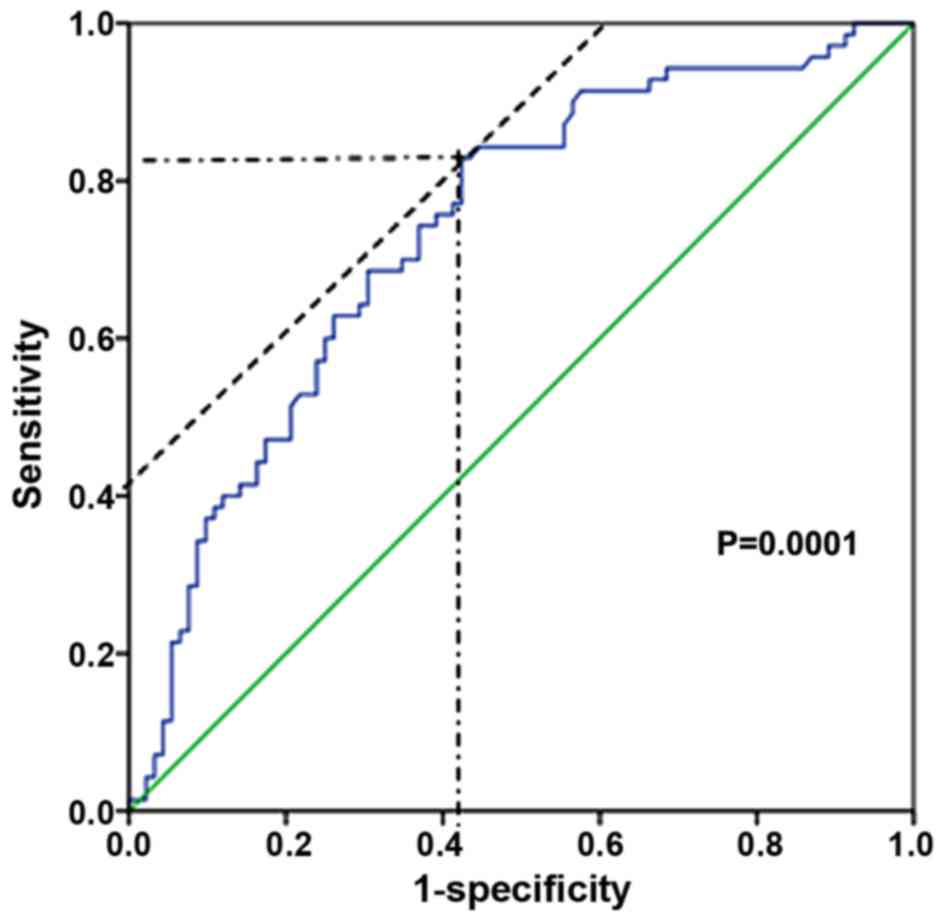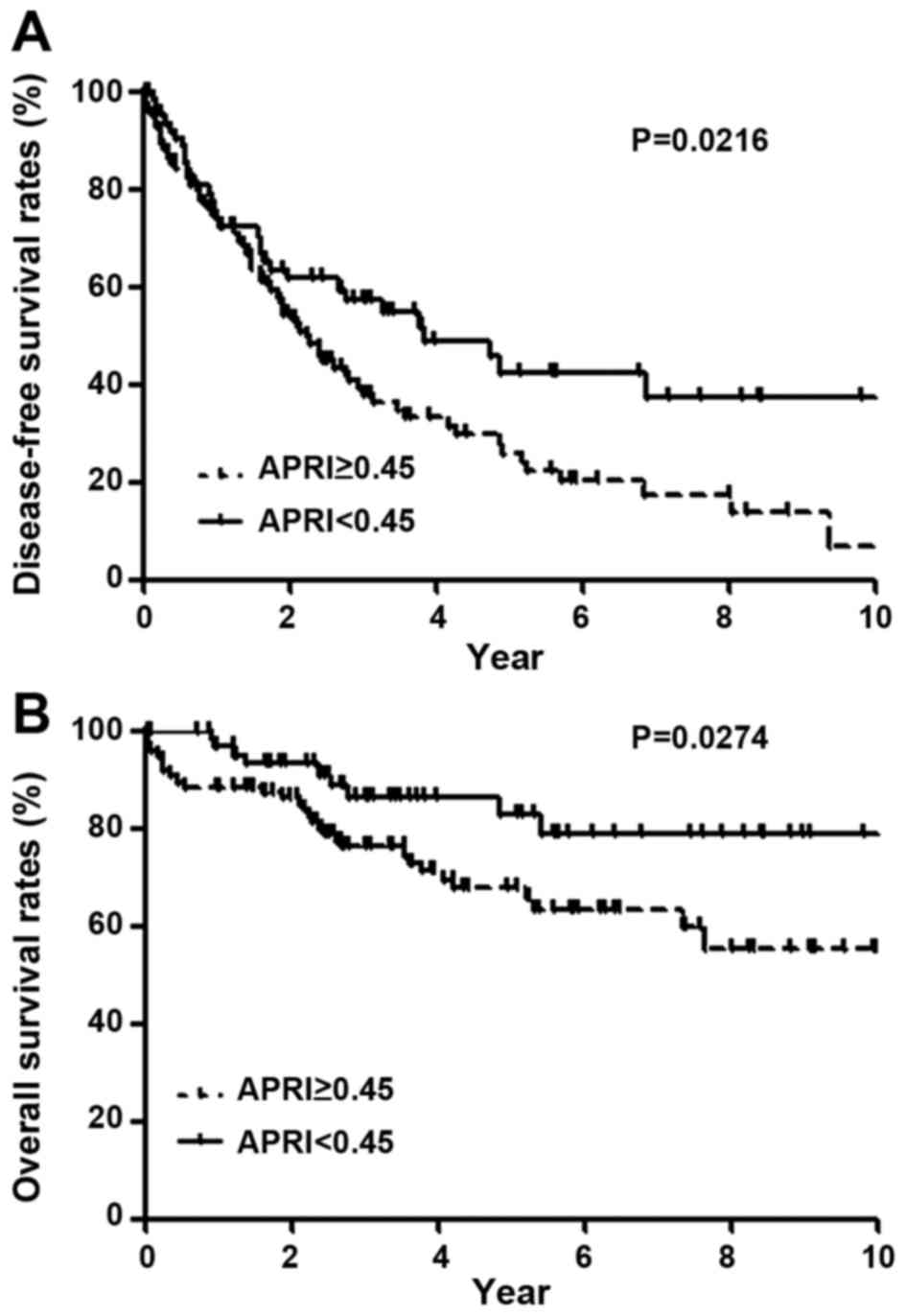|
1
|
Ferlay J, Shin HR, Bray F, Forman D,
Mathers C and Parkin DM: Estimates of worldwide burden of cancer in
2008: GLOBOCAN 2008. Int J Cancer. 127:2893–2917. 2010. View Article : Google Scholar : PubMed/NCBI
|
|
2
|
Reig M, Darnell A, Forner A, Rimola J,
Ayuso C and Bruix J: Systemic therapy for hepatocellular carcinoma:
The issue of treatment stage migration and registration of
progression using the BCLC-refined RECIST. Semin Liver Dis.
34:444–455. 2014. View Article : Google Scholar : PubMed/NCBI
|
|
3
|
Forner A, Llovet JM and Bruix J:
Hepatocellular carcinoma. Lancet. 379:1245–1255. 2012. View Article : Google Scholar : PubMed/NCBI
|
|
4
|
Mazzaferro V, Regalia E, Doci R, Andreola
S, Pulvirenti A, Bozzetti F, Montalto F, Ammatuna M, Morabito A and
Gennari L: Liver transplantation for the treatment of small
hepatocellular carcinomas in patients with cirrhosis. N Engl J Med.
334:693–699. 1996. View Article : Google Scholar : PubMed/NCBI
|
|
5
|
Clinical Practice Guidelines for
Hepatocellular Carcinoma-The Japan Society of Hepatology 2009
update. Hepatol Res. 40 Suppl 1:S2–S144. 2010.
|
|
6
|
Llovet JM, Ricci S, Mazzaferro V, Hilgard
P, Gane E, Blanc JF, de Oliveira AC, Santoro A, Raoul JL, Forner A,
et al: Sorafenib in advanced hepatocellular carcinoma. N Engl J
Med. 359:378–390. 2008. View Article : Google Scholar : PubMed/NCBI
|
|
7
|
Cheng AL, Kang YK, Chen Z, Tsao CJ, Qin S,
Kim JS, Luo R, Feng J, Ye S, Yang TS, et al: Efficacy and safety of
sorafenib in patients in the Asia-Pacific region with advanced
hepatocellular carcinoma: A phase III randomised, double-blind,
placebo-controlled trial. Lancet Oncol. 10:25–34. 2009. View Article : Google Scholar : PubMed/NCBI
|
|
8
|
Takayama T, Makuuchi M, Hirohashi S,
Sakamoto M, Yamamoto J, Shimada K, Kosuge T, Okada S, Takayasu K
and Yamasaki S: Early hepatocellular carcinoma as an entity with a
high rate of surgical cure. Hepatology. 28:1241–1246. 1998.
View Article : Google Scholar : PubMed/NCBI
|
|
9
|
Imamura H, Matsuyama Y, Tanaka E, Ohkubo
T, Hasegawa K, Miyagawa S, Sugawara Y, Minagawa M, Takayama T,
Kawasaki S and Makuuchi M: Risk factors contributing to early and
late phase intrahepatic recurrence of hepatocellular carcinoma
after hepatectomy. J Hepatol. 38:200–207. 2003. View Article : Google Scholar : PubMed/NCBI
|
|
10
|
Poon RT, Ng IO, Fan ST, Lai EC, Lo CM, Liu
CL and Wong J: Clinicopathologic features of long-term survivors
and disease-free survivors after resection of hepatocellular
carcinoma: A study of a prospective cohort. J Clin Oncol.
19:3037–3044. 2001. View Article : Google Scholar : PubMed/NCBI
|
|
11
|
Poon RT, Fan ST, Lo CM, Liu CL and Wong J:
Intrahepatic recurrence after curative resection of hepatocellular
carcinoma: Long-term results of treatment and prognostic factors.
Ann Surg. 229:216–222. 1999. View Article : Google Scholar : PubMed/NCBI
|
|
12
|
Yamamoto J, Kosuge T, Takayama T, Shimada
K, Yamasaki S, Ozaki H, Yamaguchi N and Makuuchi M: Recurrence of
hepatocellular carcinoma after surgery. Br J Surg. 83:1219–1222.
1996. View Article : Google Scholar : PubMed/NCBI
|
|
13
|
Kusaka K, Harihara Y, Torzilli G, Kubota
K, Takayama T, Makuuchi M, Mori M and Omata S: Objective evaluation
of liver consistency to estimate hepatic fibrosis and functional
reserve for hepatectomy. J Am Coll Surg. 191:47–53. 2000.
View Article : Google Scholar : PubMed/NCBI
|
|
14
|
Kumazawa K, Edamoto Y, Yanase M and
Nakayama T: Liver analysis using
gadolinium-ethoxybenzyl-diethylenetriamine pentaacetic
acid-enhanced magnetic resonance imaging: Correlation with
histological grading and quantitative liver evaluation prior to
hepatectomy. Hepatol Res. 42:1081–1088. 2012. View Article : Google Scholar : PubMed/NCBI
|
|
15
|
Wai CT, Greenson JK, Fontana RJ,
Kalbfleisch JD, Marrero JA, Conjeevaram HS and Lok AS: A simple
noninvasive index can predict both significant fibrosis and
cirrhosis in patients with chronic hepatitis C. Hepatology.
38:518–526. 2003. View Article : Google Scholar : PubMed/NCBI
|
|
16
|
Lin ZH, Xin YN, Dong QJ, Wang Q, Jiang XJ,
Zhan SH, Sun Y and Xuan SY: Performance of the aspartate
aminotransferase-to-platelet ratio index for the staging of
hepatitis C-related fibrosis: An updated meta-analysis. Hepatology.
53:726–736. 2011. View Article : Google Scholar : PubMed/NCBI
|
|
17
|
Shaheen AA and Myers RP: Diagnostic
accuracy of the aspartate aminotransferase-to-platelet ratio index
for the prediction of hepatitis C-related fibrosis: A systematic
review. Hepatology. 46:912–921. 2007. View Article : Google Scholar : PubMed/NCBI
|
|
18
|
Hung HH, Su CW, Lai CR, Chau GY, Chan CC,
Huang YH, Huo TI, Lee PC, Kao WY, Lee SD and Wu JC: Fibrosis and
AST to platelet ratio index predict post-operative prognosis for
solitary small hepatitis B-related hepatocellular carcinoma.
Hepatol Int. 4:691–699. 2010. View Article : Google Scholar : PubMed/NCBI
|
|
19
|
Miyagawa S, Makuuchi M, Kawasaki S and
Kakazu T: Criteria for safe hepatic resection. Am J Surg.
169:589–594. 1995. View Article : Google Scholar : PubMed/NCBI
|
|
20
|
Shiba H, Ishida Y, Wakiyama S, Iida T,
Matsumoto M, Sakamoto T, Ito R, Gocho T, Furukawa K, Fujiwara Y, et
al: Negative impact of blood transfusion on recurrence and
prognosis of hepatocellular carcinoma after hepatic resection. J
Gastrointest Surg. 13:1636–1642. 2009. View Article : Google Scholar : PubMed/NCBI
|
|
21
|
Edge SB and Compton CC: The American Joint
Committee on Cancer: The 7th edition of the AJCC cancer staging
manual and the future of TNM. Ann Surg Oncol. 17:1471–1474. 2010.
View Article : Google Scholar : PubMed/NCBI
|
|
22
|
Pugh RN, Murray-Lyon IM, Dawson JL,
Pietroni MC and Williams R: Transection of the oesophagus for
bleeding oesophageal varices. Br J Surg. 60:646–649. 1973.
View Article : Google Scholar : PubMed/NCBI
|
|
23
|
Minagawa M, Ikai I, Matsuyama Y, Yamaoka Y
and Makuuchi M: Staging of hepatocellular carcinoma: Assessment of
the Japanese TNM and AJCC/UICC TNM systems in a cohort of 13,772
patients in Japan. Ann Surg. 245:909–922. 2007. View Article : Google Scholar : PubMed/NCBI
|
|
24
|
Chevallier M, Guerret S, Chossegros P,
Gerard F and Grimaud JA: A histological semiquantitative scoring
system for evaluation of hepatic fibrosis in needle liver biopsy
specimens: Comparison with morphometric studies. Hepatology.
20:349–355. 1994. View Article : Google Scholar : PubMed/NCBI
|
|
25
|
Cadranel JF, Rufat P and Degos F:
Practices of liver biopsy in France: Results of a prospective
nationwide survey. For the group of epidemiology of the French
association for the study of the liver (AFEF). Hepatology.
32:477–481. 2000. View Article : Google Scholar : PubMed/NCBI
|
|
26
|
Regev A, Berho M, Jeffers LJ, Milikowski
C, Molina EG, Pyrsopoulos NT, Feng ZZ, Reddy KR and Schiff ER:
Sampling error and intraobserver variation in liver biopsy in
patients with chronic HCV infection. Am J Gastroenterol.
97:2614–2618. 2002. View Article : Google Scholar : PubMed/NCBI
|
|
27
|
Westin J, Lagging LM, Wejstål R, Norkrans
G and Dhillon AP: Interobserver study of liver histopathology using
the Ishak score in patients with chronic hepatitis C virus
infection. Liver. 19:183–187. 1999. View Article : Google Scholar : PubMed/NCBI
|
|
28
|
Intraobserver and interobserver variations
in liver biopsy interpretation in patients with chronic hepatitis
C. The French METAVIR cooperative study group. Hepatology.
20:15–20. 1994. View Article : Google Scholar : PubMed/NCBI
|
|
29
|
Shiha G, Sarin SK, Ibrahim AE, Omata M,
Kumar A, Lesmana LA, Leung N, Tozun N, Hamid S, Jafri W, et al:
Liver fibrosis: Consensus recommendations of the Asian pacific
association for the study of the liver (APASL). Hepatol Int.
3:323–333. 2009. View Article : Google Scholar : PubMed/NCBI
|
|
30
|
Nishiguchi S, Kuroki T, Nakatani S,
Morimoto H, Takeda T, Nakajima S, Shiomi S, Seki S, Kobayashi K and
Otani S: Randomised trial of effects of interferon-alpha on
incidence of hepatocellular carcinoma in chronic active hepatitis C
with cirrhosis. Lancet. 346:1051–1055. 1995. View Article : Google Scholar : PubMed/NCBI
|
|
31
|
Liaw YF and Chu CM: Hepatitis B virus
infection. Lancet. 373:582–592. 2009. View Article : Google Scholar : PubMed/NCBI
|
|
32
|
Kawaguchi T, Kakuma T, Yatsuhashi H,
Watanabe H, Saitsu H, Nakao K, Taketomi A, Ohta S, Tabaru A,
Takenaka K, et al: Data mining reveals complex interactions of risk
factors and clinical feature profiling associated with the staging
of non-hepatitis B virus/non-hepatitis C virus-related
hepatocellular carcinoma. Hepatol Res. 41:564–571. 2011. View Article : Google Scholar : PubMed/NCBI
|
|
33
|
Yamamoto J, Kosuge T, Takayama T, Shimada
K, Yamasaki S, Ozaki H, Yamaguchi N, Mizuno S and Makuuchi M:
Perioperative blood transfusion promotes recurrence of
hepatocellular carcinoma after hepatectomy. Surgery. 115:303–309.
1994.PubMed/NCBI
|
|
34
|
Fujimoto J, Okamoto E, Yamanaka N, Tanaka
T and Tanaka W: Adverse effect of perioperative blood transfusions
on survival after hepatic resection for hepatocellular carcinoma.
Hepatogastroenterology. 44:1390–1396. 1997.PubMed/NCBI
|
|
35
|
Poon RT, Fan ST, Lo CM, Liu CL, Lam CM,
Yuen WK, Yeung C and Wong J: Improving perioperative outcome
expands the role of hepatectomy in management of benign and
malignant hepatobiliary diseases: Analysis of 1222 consecutive
patients from a prospective database. Ann Surg. 240:698–710.
2004.PubMed/NCBI
|
|
36
|
Zhou Y, Si X, Wu L, Su X, Li B and Zhang
Z: Influence of viral hepatitis status on prognosis in patients
undergoing hepatic resection for hepatocellular carcinoma: A
meta-analysis of observational studies. World J Surg Oncol.
9:1082011. View Article : Google Scholar : PubMed/NCBI
|
















